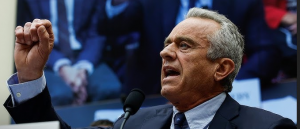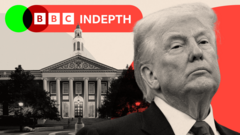In a pivotal week for incoming Secretary of Health and Human Services Robert F. Kennedy Jr., the President-elect Donald Trump’s recent choice has ignited considerable debate. Kennedy, an established environmental lawyer known for his vocal skepticism regarding vaccines, is scheduled to meet with senators for four consecutive days to discuss his potential confirmation.
Trump's Health Secretary Pick Robert F. Kennedy Jr. Faces Senate Scrutiny

Trump's Health Secretary Pick Robert F. Kennedy Jr. Faces Senate Scrutiny
Kennedy's controversial stance on vaccines and dental health policies raises questions ahead of confirmation meetings.
Named as the next head of the Department of Health and Human Services (HHS), Kennedy is set to engage closely with key lawmakers, including future chairperson of the Senate Health, Education, Labor, and Pensions (HELP) Committee, Senator Bill Cassidy (R-LA). Notably, on Thursday, Kennedy is expected to gather with Republican staff members of the HELP panel—a significant milestone as he seeks confirmation for his new post.
Kennedy's controversial public health beliefs have prompted serious concerns among experts and lawmakers. A notable figure in anti-vaccine movements, he has persistently endorsed unproven theories correlating vaccines with conditions such as autism. More recently, he stirred additional controversy with a proposal to eliminate fluoride from the national water supply—a plan he reiterated in a recent post on X (formerly Twitter), igniting alarm amongst advocates of dental health who emphasize fluoridation's crucial role in preventing cavities.
As Kennedy prepares for intense discussions with senators, his long history of challenging conventional public health measures is expected to be at the forefront. Critics within the medical and scientific communities caution that the removal of fluoride could have dire implications for healthcare access in underserved communities. Republican legislators will need to evaluate Kennedy's record on environmental issues against the backdrop of his contentious health policies.
Supporters of Kennedy argue that his tendency to challenge traditional perspectives is an asset that makes him a strong candidate for HHS. They cite his extensive career advocating for environmental accountability, asserting that such experience could lead to significant advancements in public health.
The outcome of Kennedy’s meetings this week is crucial, setting the stage for his nomination. As he faces intense scrutiny, his ability to navigate these discussions may determine if he gains the necessary support to solidify his appointment under the Trump administration.
Kennedy's controversial public health beliefs have prompted serious concerns among experts and lawmakers. A notable figure in anti-vaccine movements, he has persistently endorsed unproven theories correlating vaccines with conditions such as autism. More recently, he stirred additional controversy with a proposal to eliminate fluoride from the national water supply—a plan he reiterated in a recent post on X (formerly Twitter), igniting alarm amongst advocates of dental health who emphasize fluoridation's crucial role in preventing cavities.
As Kennedy prepares for intense discussions with senators, his long history of challenging conventional public health measures is expected to be at the forefront. Critics within the medical and scientific communities caution that the removal of fluoride could have dire implications for healthcare access in underserved communities. Republican legislators will need to evaluate Kennedy's record on environmental issues against the backdrop of his contentious health policies.
Supporters of Kennedy argue that his tendency to challenge traditional perspectives is an asset that makes him a strong candidate for HHS. They cite his extensive career advocating for environmental accountability, asserting that such experience could lead to significant advancements in public health.
The outcome of Kennedy’s meetings this week is crucial, setting the stage for his nomination. As he faces intense scrutiny, his ability to navigate these discussions may determine if he gains the necessary support to solidify his appointment under the Trump administration.





















